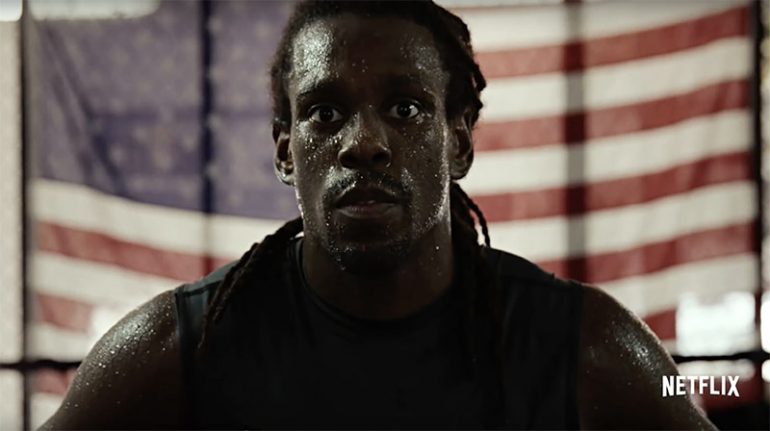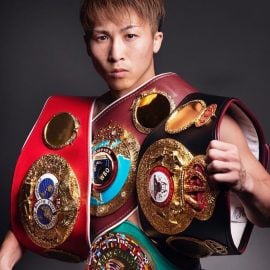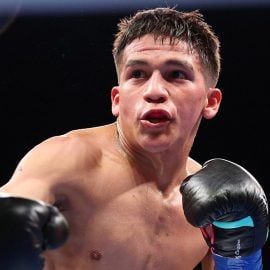‘Counterpunch’ traces challenges faced by modern boxers

Filmmaker Jay Bulger, to this point, has been best known for getting smashed in the face by irascible drummer Ginger Baker in his superbly done documentary “Beware of Mr. Baker.”
The Cream drummer and Bulger patched things up, but the filmer still, it seems, is drawn to subjects of complexity which seethe and also soothe, with differing elements of ying and yang, and which are arguably misunderstood.
In his latest opus, Bulger puts the lens to boxing, the fight game, that sweet but more often savage science which has diminished in import and popularity within the United States in recent decades. But boxing still stands as a slightly bowed but still proud art, which in fact serves to lift up far more souls than it drags down, perception and reputation notwithstanding.
Bulger joined the Everlast podcast “Talkbox” to discuss the film, “Counterpunch,” which is exclusive to Netflix and currently available to watch on the channel.
Peter Quillin, young pro Christopher “Lil B Hop” Colbert and amateur Cam F. Awesome allowed themselves to be stalked by Bulger over a span of a year-plus, and the footage and Bulger’s narration helps even seasoned fight folks get a better sense of what the sport means to the practitioners.
Quillin is on the ascent, enjoying a taste of the good life, but that comes with intricacy as he tries to negotiate the best path to best maximize his peak earning years. Advisers help steer him, and he has to decide if the advice is sound. He’s making great money but not fighting as often as some naysayers think he should.
Colbert is starting out, eyes wide in anticipation and hopefulness. His promise is immense and his eagerness to strive upwards can’t be contained.
Awesome shows himself to be a buoyant and charismatic man, staying within the confines of the amateur scene — a rare path in this age, where if it don’t make dollars, it don’t make sense.
Bulger smartly dots the work with hits from notables like Sugar Ray Leonard, Oscar De La Hoya and Paul Malignaggi, and fight writers like me and Steve Kim, as well as the pugilists’ family members. It all adds up to an enjoyable tour of the boxing scene circa 2016-2017, and a thought-provoking document that addresses who we are as professionals and artists in this new age of economic upheaval and income inequality. I touch on that aspect, obliquely, when I talk in the film, barefoot on my stoop, about the legacy of Floyd Mayweather Jr.
He’s a one-of-a-kind person who has been blessed with remarkable talent. Young guns seek to replicate his path but without his level of skill, it is a super-Sisyphean task. Try to chase those stacks that he’s accumulated and you might lose sight of the less bling-y dividends the sport and life can pay, is one message I tried to convey.
The flick has been translated into 65 languages and is seen now in 190 countries. I asked Bulger, who grew up in the D.C. area, why he made the film. “Those guys are my main characters,” he told us. “And yourself … I thought you were the man on the street, literally, and it was awesome. It was awesome to have that blue collar (element) … It felt like we were on “Do the Right Thing Part 2,” that set.”
We touched on money, no surprise, as it is a main reason why so many enter, or stay, in the game. Bulger visited my Brooklyn residence two summers ago and we talked the state of the game. We talked about how the game has changed, how the public at large sees, or doesn’t pay attention to, the sweet science. I clarified for people who watched the movie what I was thinking while I spoke, and that I was thinking about how striving for material goods or riches isn’t the optimal path to happiness. It works I guess for Mayweather, but for most of us, it won’t work. “You also said we’re living in a generation of narcissists, and it’s true,” Bulger pointed out. “Floyd is one in a million, guys,” I told Bulger when he visited the Everlast headquarters, trying to convince one or two peeps that it’s impossible to walk in the same foot-path as the gods.
We talked about TBE, Mayweather, and Bulger sagely noted that Floyd is sober, and some guys trying to emulate him are not. (The pod is a fun listen, I think.)
The filmmaker told us he did Golden Gloves in D.C. and N.Y., in the Bronx, at Fordham, where he schooled. “I love boxing and I also saw how much of an opportunity it afforded communities,” he told us. He said that he thinks now as much as ever, with cops and the average Joes too often at odds, boxing, and police athletic leagues, can bridge the gap. “Boxers are daring, individualistic, maybe team sports aren’t for them … and those kids also excel at drug-dealing and shootouts, the wild wild west. Billy the Kid woulda probably been a pretty good boxer.” Those little community gyms can be saviors to kids on those wayward paths. He spoke of “Lil B Hop,” who might have been a bank robber, or what have you, if boxing hadn’t found him. Bulger was touched by the fact that many of the gyms he trained in and that helped him find his way have closed. “Boxing is for people who need to fight their way out of something,” he summarized.
Quillin, Bulger saw him come up in the N.Y. Golden Gloves. Then he saw Quillin give up his middleweight title belt, a strategic move, and that helps us get where boxing is at now. Titles are great, but isn’t maximizing one’s earning power more important than the glory … because belts won’t pay bills when the applause dies down? Bulger presents us the conundrums and allows us to try and decide.
We see Quillin during highs and then lows, such as after he was stopped by Danny Jacobs in December 2015. Bulger has footage of Quillin in his dressing room after the loss. “He could not have been more of a gentleman after that fight,” Bulger said, and we both agreed his popularity rose in defeat, because he dealt with it so gracefully. “We watch these guys fight, and the only way we can really relate to them is when lose,” Bulger pointed out. We discussed how people would more identify with a Floyd Mayweather if he lost … because we are ALL familiar with that feeling.
It will remain to be seen: Were the decisions and paths taken by Quillin the right ones? No one has IT ALL, we agreed, every duck in a row in every sphere of life. If you make oodles of loot, you are likely a work-a-holic, and relationships suffer, for example. I did wonder who in the flick Bulger predicts will turn out to be the happiest soul. “One hundred percent, Cam Awesome,” he said right away. Cam isn’t in it for the money, is fighting for the experience and as part of a nation, of something bigger than himself. “He will have a better outcome as a result of this movie … and Lil B Hop apparently got a call from (a bigtime movie producer),” he shared.
Bulger told us that Colbert could use a bump in activity, in the ring, though. His talent is there and he hasn’t been propelled correctly, given enough fights, Bulger said. “Al Haymon, what’s up, man?” Bulger said. “The kid’s a star, make him one,” he pleaded on behalf of the 6-0 featherweight, who fought once in 2016 and just once so far in 2017.
Bulger has been frustrated how the Premier Boxing Champions push didn’t get more buzz and eyeballs. Why was content on BOUNCE, he asked. But, I noted, it was placed on NBC and ESPN … Bulger would have liked to see PBC buy ESPN Friday Night Fights, and put their guys on there. “They had an opportunity with all that money to bring Friday Night Fights to the next level. Instead they just let it languish and put all these fights on Bounce … as a sport, what has PBC accomplished? Is there one guy who has come out of this a household name?” Bulger asked. OK, Keith Thurman and Errol Spence have elevated … but it could have been so much better, he said.
Can boxing not get bigger because of what we know about brain trauma? Nah, Bulger said; MMA is flourishing. And he finds that sport to be too brutal. Did you see Heather Hardy’s face after her first MMA fight? That didn’t happen in boxing, Bulger pointed out. So no, the violence problem isn’t the problem, why boxing isn’t on a severe upswing. The sport needs good and better personalities, Bulger said. There are plenty of things going right. “I think Paul Malignaggi is the best thing going in boxing right now,” he said, lauding the Showtime analyst’s chops. He is current and vibrant, whereas some other outlets are stuck in a previous era. There needs to be a better job done capturing personalities, Bulger opined. “How do they not have a Danny Jacobs doll?” he asked, noting how Jacobs beat cancer and has a buoyant persona. He thinks he’s done it the right way in the film. He wanted to let people who don’t play drums get sucked into the Baker story, and people who don’t dig boxing appreciate the sweet science. The sport has created American heroes, and Hollywood knows this … why hasn’t the sport done a better job conveying that to the masses? “Boxing is a great pool and source of inspiration for people, particularly in this downtrodden time in the U.S. And I don’t understand how we don’t have household boxing names!”
It’s complex; guys can fight less, make more, but aren’t as well known as they thought they’d be. There is no perfect recipe in this realm, I don’t think.
Bulger wants feedback; he doesn’t get much of it from Netflix. “Baker” won awards, but “Counterpunch” didn’t go to film fests, so the reaction will have to come from the people. He said he’s happy he got to make the film he wanted to make. “I really hope people watch it. I assume millions of people are going to watch it,” Bulger said.
Here’s hoping that is so, and a goodly percentage of them come around to what it is that we love about the red-light district of sports.
















